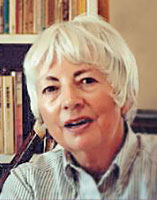A Quote by Riley Stearns
For me, I never look down at my characters.
Quote Topics
Related Quotes
When you start writing, you have your characters on a metaphorical paved road, and as they go down it, all these other roads become available that they can go down. And a lot of writers have roadblocks in front of those roads: they won’t allow their characters to go down those roads... I’ve never put any roadblocks on any of these paths. My characters can go wherever they would naturally go, and I’ll follow them.
If people ever look down upon you for crying for fictional characters, you should give them a gentle, pitying look and feel bad for them. If they've never cried for a fictional character, then they've never loved one (and what a joy that is). If they've never cried at a book, a movie, a piece of music, then they've missed one of the great pleasures life has to offer. Just because fiction does not contain things that are real doesn't mean it doesn't contain truth, and we find it through the alchemy of our tears.
You know in cartoons, the way someone can run off a cliff and they're fine, they don't fall down until they look down? My mom always said that was the secret of life. Never look down. But it's more than that. It's not just about looking. It's about never realizing that you're in the middle of the air and you don't know how to fly.
I look at the books on my library shelves. They certainly seem dormant. But what if the characters are quietly rearranging themselves? What if Emma Woodhouse doesn't learn from her mistakes? What if Tom Jones descends into a sodden life of poaching and outlawry? What if Eve resists Satan, remembering God's injunction and Adam's loving advice? I imagine all the characters bustling to get back into their places as they feel me taking the book down from the shelf. Hurry, they say, he'll expect to find us exactly where he left us, never mind how much his life has changed in the meantime.
One of the things when you write, well the way I write, is that you are writing your scenario and there are different roads that become available that the characters could go down. Screenwriters will have a habit of putting road blocks up against some of those roads because basically they can't afford to have their characters go down there because they think they are writing a movie or trying to sell a script or something like that. I have never put that kind of imposition on my characters. Wherever they go I follow.
If you get the characters right you've done sometimes nearly half the work. I sometimes find I get the characters right then the characters will often help me write the book - not what they look like that's not very important - what people look like is not about their character. You have to describe the shape they leave in the world, how they react to things, what effect they have on people and you do that by telling their story.































